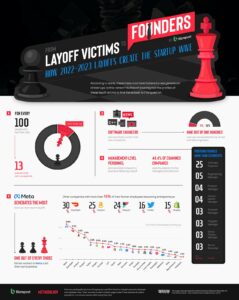For over a century, obtaining a four-year college degree has been hailed as an effective means of achieving the American dream. However, the rising cost of tuition has now exceeded the average household income. This has resulted in students acquiring debt just to attend college, with some still paying off loans for decades.
As a result, there have been increasing demands for alternatives that can provide students with the necessary skills. Unfortunately, once-promising online programs like massive open online courses (MOOCs) have completion rates of less than 5 percent. Even traditional community colleges fall short of meeting students’ needs, as less than half of the students who attend these institutions complete their 2-year degrees within six years.
It’s against this backdrop that Tade Oyerinde and his co-founder decided to launch Campus.edu, an EdTech startup that’s transforming higher education by making community college affordable and accessible to everyone across the country. Campus is an accredited college that provides both live online and in-person associate degrees and certificate programs.
What sets Campus apart from most traditional community colleges is its online degree programs, known as Campus Scholars programs, which are taught by a network of professors who also teach at prestigious universities and HBCUs such as Princeton, Spelman, NYU, and Vanderbilt.
Today, Campus.edu announced it has raised $29 million in funding to “democratize top-tier education for students who might not otherwise have access.” The round was backed by high-profile investors including Discord founder Jason Citron; OpenAI founder Sam Altman; Figma founder Dylan Field; former head of Stripe Issuing Lachy Groom; Bloomberg Beta; Founders Fund; Rethink Education; Reach Capital and Precursor Ventures, among other investors.
Tuition for these programs is offered at a rate lower than the maximum Pell Grant award, making it possible for many students to avoid paying out-of-pocket tuition expenses. Campus takes inspiration from CUNY’s Accelerated Study in Associate Programs (ASAP) and provides every student with the necessary resources to ensure their academic success, including a free laptop, free WiFi, unlimited tutoring, and individual support coaches. Campus also offers faculty members an opportunity to supplement their teaching income, with the average Campus professor increasing their annual income by 20 percent.
“Campus is about maximizing access to a world-class education regardless of one’s background or household income. We’re making higher education more accessible, more affordable, and more relevant to the real-world challenges and opportunities that students face today,” said Tade Oyerinde, Founder and Chancellor of Campus, and the first Black 29-year-old college dropout to become Chancellor of a college.

Tade Oyerinde, Founder and Chancellor of Campus
“Campus provides a unique opportunity to democratize top-tier education for students who might not otherwise have access,” said Campus professor Steven Kelts, who also teaches politics at Princeton. “Campus is not only extending an important opportunity to students who need it, it’s also offering better employment options for the adjunct faculty community.”
So far, Campus has about 850 students enrolled today. More than 80 percent of Campus students are female, and many are from underrepresented populations. Most Campus students also work at least 10 hours a week.
“As an immigrant and first-generation college student trying to launch my career, I didn’t expect to find a path to a college degree that fit my needs and goals, but Campus has made it a reality for me,” said Campus student Josephine L.
Last year, Campus acquired MTI College, a Sacramento-based college that was founded in 1965, with approval from its accreditor, the Accrediting Commission for Community and Junior Colleges (ACCJC). It will use the remainder of its $29 million to invest in its technology platform; recruit and retain professors; and further support its offerings to students.
“Higher education has failed to serve too many students for far too long,” said Jason Citron, CEO and founder of Discord. “I dropped out of my local college after one semester because the curriculum wasn’t engaging for me. Fortunately, I was able to transfer to an alternative school, but even my experience is yet another example that the traditional higher ed experience is not for everyone. I’m excited to support the Campus team as they reimagine solutions that fit students’ actual learning needs and equip them to succeed, while trying to eliminate debt for students.”
As part of the launch, Campus also announced the appointment of a distinguished Board of Trustees, which includes Dr. Arthur Levine, President Emeritus, Teachers College, Columbia University; Dr. Eduardo Padrón, President Emeritus, Miami Dade College; Dr. Gail O. Mellow, former President, LaGuardia Community College; Dr. Joe May, Chancellor Emeritus, Dallas College; and Dr. John Wilson, former President, Morehouse College. Ralph Wolff, former President, WASC Senior College and University Commission, will serve as board secretary.
Oyerinde, who dropped out of his Aerospace Engineering degree after starting his first company, previously founded Campuswire — a leading online learning platform used by students and professors from over 300 universities — which inspired him to build Campus. Oyerinde comes from a long line of educators and has firsthand experience with online education, having been homeschooled online from 1st through 8th grade.
He added, “A great education — one filled with inspirational professors, fellow students you can learn from, and a cadre of supportive advisors — is a critical (but missing) stepping stone for all too many young Americans to get to build the lives they want for themselves. Campus blends the best parts of traditional and online education, and combines that with the skills and support that today’s students want and need.”
- SEO Powered Content & PR Distribution. Get Amplified Today.
- PlatoAiStream. Web3 Data Intelligence. Knowledge Amplified. Access Here.
- Minting the Future w Adryenn Ashley. Access Here.
- Source: https://techstartups.com/2023/05/01/edtech-startup-campus-edu-raises-29m-in-funding-to-provide-an-online-alternative-to-traditional-community-college/
- :has
- :is
- :not
- 10
- 1st
- 20
- a
- Able
- About
- academic
- accelerated
- access
- accessible
- accredited
- achieving
- acquired
- acquiring
- across
- added
- advisors
- Aerospace
- aerospace engineering
- affordable
- After
- against
- All
- also
- alternative
- alternatives
- American
- Americans
- among
- an
- and
- announced
- annual
- Another
- apart
- appointment
- approval
- ARE
- Arthur
- AS
- Associate
- At
- attend
- average
- avoid
- award
- backdrop
- backed
- background
- because
- become
- been
- BEST
- beta
- Better
- Black
- Bloomberg
- board
- both
- build
- but
- by
- Campus
- CAN
- capital
- Career
- Century
- ceo
- CEO and Founder
- certificate
- challenges
- Co-founder
- College
- Colleges
- Columbia
- combines
- comes
- commission
- community
- community college
- company
- complete
- completion
- Cost
- country
- courses
- critical
- Curriculum
- Dallas
- Debt
- decades
- decided
- Degree
- demands
- democratize
- discord
- Distinguished
- dream
- dropped
- ed
- edtech
- Education
- educators
- Effective
- eliminate
- employment
- engaging
- Engineering
- enrolled
- ensure
- Even
- Every
- everyone
- example
- exceeded
- excited
- expect
- expenses
- experience
- extending
- Face
- Failed
- Fall
- far
- fellow
- female
- field
- figma
- filled
- Find
- First
- fit
- For
- Former
- Fortunately
- Founded
- founder
- founders
- Founders Fund
- Free
- from
- fund
- funding
- further
- get
- Goals
- grade
- grant
- great
- Half
- Have
- having
- hbcus
- head
- high-profile
- higher
- Higher education
- his
- HOURS
- household
- However
- HTTPS
- i
- important
- in
- includes
- Including
- Income
- increasing
- individual
- Inspiration
- Inspirational
- inspired
- institutions
- Invest
- Investors
- issuing
- IT
- ITS
- John
- jpg
- just
- known
- laptop
- launch
- leading
- LEARN
- learning
- least
- like
- Line
- live
- Lives
- Loans
- local
- Long
- made
- Making
- many
- massive
- maximum
- May..
- means
- meeting
- Members
- Miami
- might
- million
- missing
- more
- most
- necessary
- Need
- needs
- network
- now
- NYU
- obtaining
- of
- off
- offered
- offering
- Offerings
- Offers
- ONE
- online
- online education
- Online Learning
- only
- open
- OpenAI
- opportunities
- Opportunity
- Options
- or
- Other
- otherwise
- out
- over
- part
- parts
- path
- paying
- percent
- platform
- plato
- Plato Data Intelligence
- PlatoData
- politics
- populations
- possible
- precursor
- precursor ventures
- president
- prestigious
- previously
- princeton
- Professor
- Programs
- provide
- provides
- raised
- raises
- Rate
- Rates
- reach
- real world
- Reality
- Regardless
- relevant
- Resources
- result
- retain
- rising
- round
- Said
- Sam
- Scholars
- School
- secretary
- senior
- serve
- Sets
- Short
- SIX
- skills
- Solutions
- some
- Starting
- startup
- stepping
- Still
- STONE
- stripe
- Student
- Students
- Study
- succeed
- success
- such
- supplement
- support
- supportive
- takes
- teachers
- Teaching
- team
- Technology
- than
- that
- The
- their
- Them
- themselves
- There.
- These
- they
- this
- Through
- to
- today
- today’s
- too
- traditional
- transfer
- transforming
- Tutoring
- underrepresented
- unfortunately
- unique
- Universities
- university
- unlimited
- use
- used
- Ventures
- want
- was
- week
- which
- while
- WHO
- wifi
- will
- Wilson
- with
- within
- Work
- world-class
- year
- years
- yet
- you
- young
- zephyrnet












